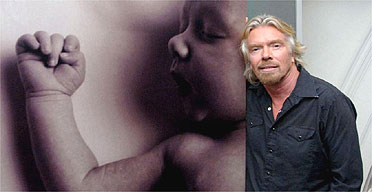
The entrepreneur Sir Richard Branson today launched a controversial new service allowing parents to store stem cells from their child's umbilical cord.
For a £1,500 fee, parents will be able to bank the cells from the umbilical blood in cold storage.
Sir Richard said the enterprise, called Virgin Health Bank, also had a charitable arm. Half of the blood collected from the umbilical cords would go to the National Blood Service in an effort to increase the chances of a patient being able to find a stem cell match.
Some scientists believe future advances in medical technology will allow stem cells to be used to cure conditions such as heart disease, Alzheimer's disease, Parkinson's disease, cancer and spinal cord injuries.
But the Royal College of Obstetricians and Gynaecologists (RCOG) says that banking cord stem blood is unlikely to be of much use to families with no history of blood disease. The National Child Birth Trust (NCT) is also concerned that the process of extracting umbilical blood during birth could pose a risk to both mother and child.
A Virgin spokeswoman said: "This is a unique initiative that will help address the global shortage of matched stem cells available to patients who need life-saving treatments.
"The initiative will also help drive further research into regenerative medicine and treatments with stem cells."
But the company admitted that a child in a family at low risk of developing serious blood diseases was unlikely to need its own cord blood as an alternative to a bone marrow transplant.
Some companies already offer the service in the UK. One is Future Health, which charges £1,250 to transport cord blood to their laboratory and process it for cold storage. Parents are then charged an annual £35 storage fee.
The Sunday Times reported last year that in the previous five years more than 11,000 British parents had stored their babies' stem cells in such banks.
Among these, the paper reported, were the dancer Darcy Bussell and five Premier League footballers, including Arsenal's Thierry Henry. One unnamed player said the stored stem cells could provide a potential future treatment for his own sports injuries.
Sir Richard told BBC Radio 4's Today programme that the higher the number of samples stored, the greater the chance of finding a treatment for diseases such as leukaemia.
He said: "If you can actually get the amount of samples stored from 7,000 to 100,000, 200,000, 300,000, then you, as the parent, may well find that your child has leukaemia in the next few years, and therefore it will be extremely useful."
Leukaemia patients often undergo radiation treatment or chemotherapy to kill their cancerous white blood cells, a treatment that also depletes their immune systems. To counteract this side effect, doctors give the patients infusions of bone marrow or umbilical cord blood, both of which contain stem cells capable of developing into every kind of blood cell.
Cord blood has a significant advantage over marrow, however, because its stem cells are less likely to attack the recipient's body.
David Grant, the scientific director of Leukaemia Research, said: "In the UK alone there are approximately 40 children a year with a variety of diseases of the blood, including leukaemia, whose best chance of survival is a cord blood transplant. We welcome any initiative which increases the effective availability of cord blood stem cells for public use."
The Royal College of Obstetricians and Gynaecologists (RCOG) said there was little evidence to recommend private cord blood banking for families at low risk of blood diseases. But it applauded Virgin Health Bank's intention to develop a substantial bank of cord blood that would be available internationally.
Peter Braude, the chairman of the RCOG scientific advisory committee, said: "Regenerative medicine holds great promise for future management of many diseases, and cord blood stem cells might fulfil that promise if they can be expanded and grown successfully in large numbers. So far this has not been the case, but it may change in the future.
"This proposal provides a long term insurance lottery that may or may not prove to be successful. However, in the wake of the personal storage of a teaspoonful of stem cells for the child itself, is the possibility of a significant increase in the availability of larger cord blood samples for all through a form of public banking."
Belinda Phipps, chief executive of the NCT said: "The method recommended and used by many commercial companies to collect stem cells risks interrupting the birth process, especially the third stage of labour, which is a particularly critical time for both mother and baby. Should parents wish to use such services they need to have access to all the information in order to fully understand the risks involved and make an informed choice. Promotion of this service risks inducing guilt and concern in parents who believe they should use it, but who may be unaware of the lack of evidence to support it."

